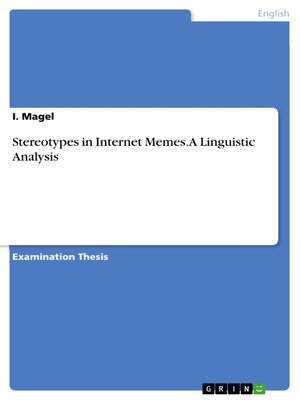
Sign up to save your library
With an OverDrive account, you can save your favorite libraries for at-a-glance information about availability. Find out more about OverDrive accounts.
Find this title in Libby, the library reading app by OverDrive.



Search for a digital library with this title
Title found at these libraries:
| Library Name | Distance |
|---|---|
| Loading... |
Examination Thesis from the year 2016 in the subject English Language and Literature Studies - Linguistics, grade: 2,0, , language: English, abstract: At first glance, internet memes seem to be the humorous part of our digital culture. Indeed, they are! But they also reveal stereotypical thinking, which I will focus on in my analysis. This analysis will investigate thoroughly internet memes from a linguistic viewpoint. Starting from Richard Dawkins' definition via Susan Blackmore's third replicator theory through to Limor Shifman's critical approach about the state of research concerning memes, Internet memes are also examined from a communication-oriented view. Successful Black Man, Successful White Man, Ordinary Muslim Man and High Expectation Asian Father serve as a basis for my analysis. A combination of Semiotic Analysis and Discourse Analysis is used in order to examine the selected examples. Both methods were chosen because Internet memes involve written texts as well as signs or images which contain invisible meaning. All results taken together, this thesis will show that Internet memes are still interpreted stereotypically in our multicultural present-day society.







